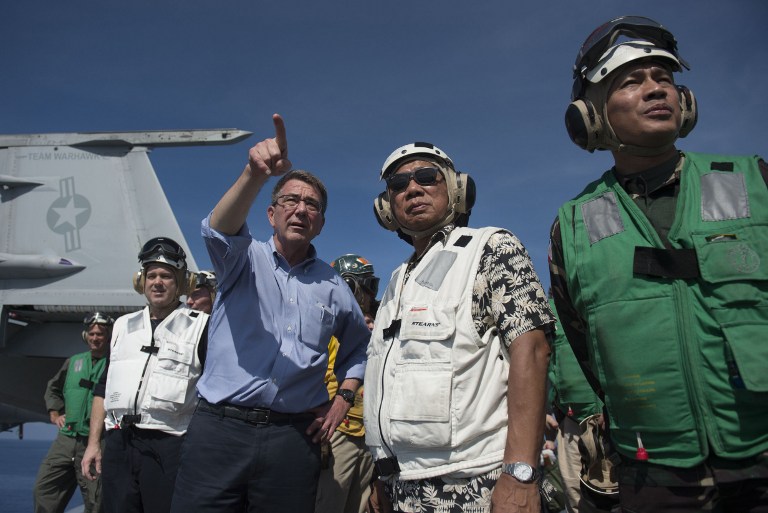
by Laurent BARTHELEMY
The United States is still inviting China to take part in a mammoth, multinational naval exercise in the Pacific later this year despite growing bilateral tensions, Defense Secretary Ashton Carter said Friday.
Carter, who just concluded a visit to the Philippines to show Washington’s continued commitment to maintaining security in the region, said China was still welcome to attend the biannual Rim of the Pacific (RIMPAC) exercise off Hawaii in June and July.
“We have not taken the step of disinviting them,” Carter said during a visit to the US aircraft carrier USS John C. Stennis.
“Our approach has always been to try to include everyone,” he told reporters.
American congressmen had previously called for China to be disinvited from RIMPAC, the largest international naval exercises in the Pacific under US leadership.
The legislators cited China’s aggressive actions in pressing its claim over maritime territory in Asia.
During his visit to the archipelago, Carter had stressed that the United States would stand with the Philippines and its other allies against “coercion and intimidation”.
China claims nearly all of the strategically vital South China Sea, even waters close to its Southeast Asian neighbours like the Philippines.
In recent years, it built up artificial islands in an effort to assert what it insists are its sovereign rights.
The Philippines, Vietnam, Malaysia, Brunei and Taiwan also have overlapping claims to parts of the sea, which is home to some of the world’s most important shipping lanes and is believed to sit atop vast oil reserves.
The Philippines, a close US ally, has been among the most vocal in criticising China’s actions, even asking a United Nations-backed tribunal to decide on its sea disputes with China.
China took part in RIMPAC for the first time in 2014 when 23 counties, about 50 ships, six submarines and more than 25,000 troops were involved.
Defending the inclusion of China in this year’s exercise, Carter said that “even we stand strong with our alliances… we are still taking the approach that everybody ought to work together”.
He said the Chinese should “stop from standing apart from everybody” and “isolating and excluding” themselves.
“Try to be part of the system of cooperative nations that has made the Asia miracle possible,” he urged them.
© 1994-2016 Agence France-Presse








